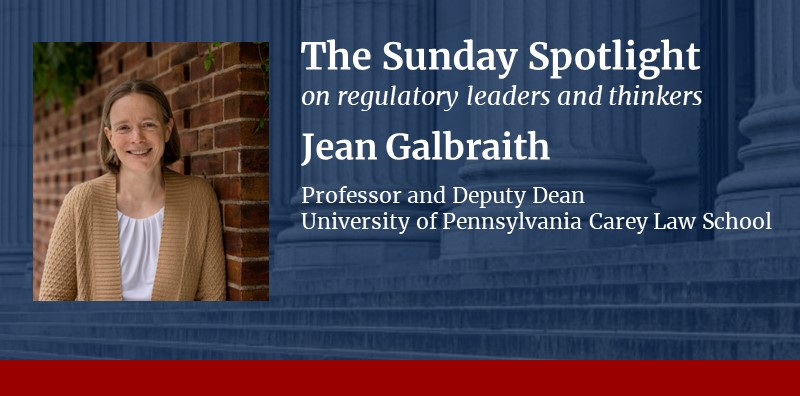
Jean Galbraith discusses the role international law plays in solving shared issues.
In a recent conversation with The Regulatory Review, international and U.S. foreign relations law scholar Jean Galbraith discusses how international regulation can be used to promote and preserve equality and justice.
Galbraith is a Professor of Law and Deputy Dean of the University of Pennsylvania Carey Law School, an elected member of the American Law Institute, a member of the Board of Editors of the American Journal of International Law, and a longstanding member of the American Society of International Law. In both 2017 and 2020, she received the Harvey Levin Memorial Award for Teaching Excellence through a vote from each graduating class. In addition, in May 2023 she received the Robert A. Gorman Award for Excellence in Teaching for her outstanding instruction in Federal Courts.
Prior to joining the ranks of legal academia, Galbraith served as a law clerk for three judges: Justice John Paul Stevens of the Supreme Court of the United States; Judge David S. Tatel of the U.S. Court of Appeals for the D.C. Circuit; and Judge Theodore Meron of the International Criminal Tribunal for the former Yugoslavia. Earlier in her career, Galbraith was also a Sharswood Fellow in Law and International Affairs, an associate at Hangley Aronchick Segal & Pudlin in Philadelphia, and an assistant professor of law at Rutgers School of Law-Camden.
Galbraith has published more than 40 articles and papers. Her research has focused on empirical analyses of treaty clauses, domestic reforms to increase international legal engagement, and the structure of international legal institutions and their connections with U.S. law.
The Regulatory Review is pleased to share the following exchange with Professor Galbraith.
TRR: Your most recent scholarly publication, Poverty Penalties as Human Rights Problems, explores the prevalence and staggering inequality of financial sanctions across the globe. What would you say to readers about addressing this problem?
A: The article you mention, which I co-authored with six students, focuses on the ways in which poverty is over-criminalized through financial penalties around the world.
We do not often think of criminal justice as regulatory. But in many ways it is regulatory – and especially with respect to misdemeanor-style offenses. These offenses often lead to unduly high fines, which in turn can perpetuate cycles of poverty and further entanglement with the criminal justice system.
These penalties are too high and are badly designed both from a regulatory perspective and a human rights perspective. They are not fair, they don’t apply best practices, and they often apply to very poor people who functionally have no voice in the design of the criminal justice system.
In terms of addressing the problem in domestic jurisdictions that use excessive financial penalties on low-income people, we need better designed and fairer financial penalties. And those penalties need to be a whole lot lower for low-income individuals. While international institutions do not have any direct regulatory power in this space, they do retain influence. They can shine a spotlight on issues, set agendas, and gather data, all in ways that will remind domestic regulators of areas for improvement. Our article is aimed at getting human rights actors to lean into this issue and use their powers to do exactly that.
TRR: What role do you think regulation plays in the international ecosystem of law and institutions generally, and how do you think it can be used to scaffold a peaceful and prosperous future?
A: Regulation plays a major role in the international ecosystem of law and institutions. Regulators have long worked together internationally to exchange best practices, to coordinate, and to problem solve. And nations can cooperate by entering into regulatory treaties and other agreements that commit them to specific steps to address the problems of the commons: our interconnected economies, oceans, environment, health, and more.
The roots of international regulatory cooperation go way back. Think, for example, of the establishment of the Universal Postal Union in 1874 to coordinate around mail delivery. And around this same time, reformers in criminal justice systems in many countries started working together to discuss best practices – including some very humane recommendations in the early 1900s about how to deal with the intersection of financial penalties and poverty.
Today, there are so many issues that are interconnected. For a successful future, we need domestic regulatory leaders working together at the international table to discuss best practices, set shared standards, and commit to coordinated regulation.
TRR: What do you see as the biggest threats to international regulatory law and institutions over the next few decades?
A: The biggest threat to international regulatory law and institutions is the possibility that our current world order will collapse entirely. We are in a time of great uncertainty, and I am unsure if the post-Cold-War era of cooperation will continue. If the world order falls apart more than it has already, then the capacity and ability to conduct international regulatory coordination will diminish inevitably, as a matter of political will. While regional conversations and ally-to-ally cooperation would likely remain, this would not fill the vacuum left by large-scale deterioration. Without broad international cooperation, we will have little hope of successfully addressing climate change and fixing other problems of the global commons.
TRR: What book would you most recommend to regulatory professionals about international regulation and why?
A: One of the foundational books in this field is The New Sovereignty: Compliance with International Regulatory Agreements by Abram Chayes and Antonia Handler Chayes. Its core idea that international regulation needs to move to a more management-based system has a lot of resonance.
Even though this book was published in 1998, it is still a wonderful resource for regulatory professionals. I still have my original copy with plenty of margin notes!
TRR: What do you enjoy doing when you are outside of the four walls of the law school?
A: I have three children, and my spouse and I love spending time with them. The two things that we all do together that I love the most are probably board games and hiking. Thankfully, they are all enthusiastic hikers, whether it be on local, state, or national park trails.
TRR: Who are your heroes?
A: The judges for whom I clerked are and remain heroes for me for their love of their law, their optimism, their brilliance, their good faith, and their unwavering commitment to the rule of law. In the international space, Judge Meron, a Holocaust survivor who has become a leading judge in the war crimes field, stands out as one of my heroes.
The Sunday Spotlight is a recurring feature of The Regulatory Review that periodically shares conversations with leaders and thinkers in the field of regulation and, in doing so, shines a light on important regulatory topics and ideas.



